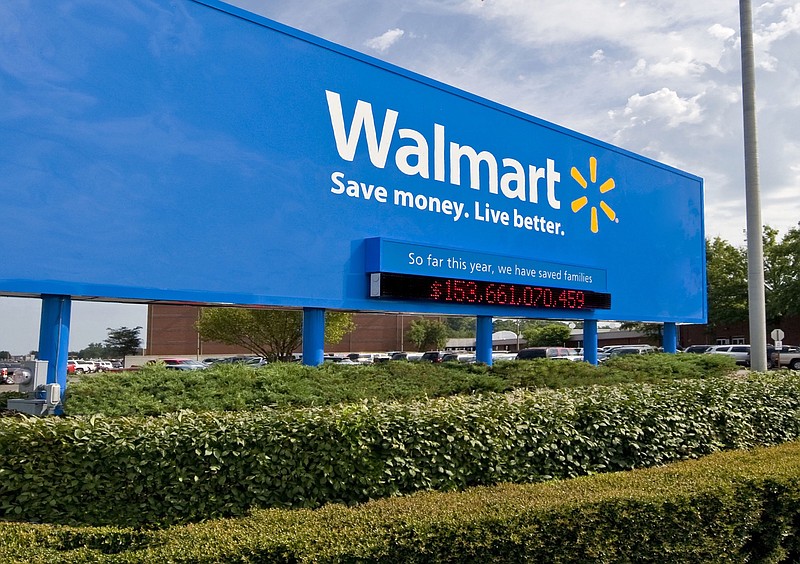Wal-Mart Stores Inc. is shortening its legal name to Walmart Inc., making a change that emphasizes the company's goal of being known as more than a big box retailer.
The Bentonville company revealed plans to drop "stores" and the hyphen from its name in a filing Wednesday with the U.S. Securities and Exchange Commission. The name change will be official on Feb. 1, the beginning of the retailer's fiscal year.
Wal-Mart Chief Executive Officer Doug McMillon said in a statement that the shift reflects efforts to serve customers in a variety of ways, whether it's in stores, online, on mobile devices or through pickup and delivery services.
"While our legal name is used in a limited number of places, we felt it was best to have a name that was consistent with the idea that you can shop us however you like as a customer," McMillon said.
The name change was revealed as Wal-Mart -- which operates more than 11,600 stores and clubs under 60 different banners worldwide -- invests heavily in its online business to compete with Amazon.com. Wal-Mart acquired Jet.com for $3.3 billion last year and has since added other online retailers to its portfolio, including Bonobos, ModCloth and Moosejaw. In addition, Wal-Mart has expanded its online assortment at Walmart.com to more than 70 million items and continues to build out its online grocery and pickup services to help drive online sales.
Meanwhile, the company said in October that it will continue to slow the number of new stores it opens to devote more capital to digital initiatives. Wal-Mart plans to open only two dozen stores during the next fiscal year.
Brian Yarbrough, a retail analyst with Edward Jones, said the name change should have no impact on investors and customers, after the company began using its current "Walmart" logo throughout operations in 2008. But Yarbrough said formally dropping "stores" from the legal name is another sign of Wal-Mart's intentions to continue increasing its online business.
Stores still generate 95 percent of Wal-Mart's revenue, Yarbrough said. "So it's obviously their bread and butter. But they've made it very clear they're going after online in a big way. So, to me, this kind of signals even more that they're putting their stake in the ground."
The company's legal name was Wal-Mart Inc. when it incorporated in 1969. The retailer moved to Wal-Mart Stores Inc. when it went public the following year and the name has remained. The retailer will continue to trade with the stock ticker WMT on the New York Stock Exchange.
"It makes a lot of sense from a branding perspective and a consistency perspective," said Martin Thoma, a principal at Little Rock brand leadership firm Thoma Thoma and author of Branding Like the Big Boys. "What they're doing is cleaning up their identity a little bit and making sure the corporate identity aligns with the consumer identity.
"We saw them drop the hyphen from their consumer-facing identity some years ago. So now they're just aligning the rest of the organizational structure with what it looks like from the outside."
There are several examples of companies that have changed their legal name to reflect a new strategy or better align the business. Thoma pointed to Apple Computers Inc., which changed its name to Apple Inc. in 2007 as the company began producing more than computers. Google Inc. changed its name to Alphabet Inc. in 2015 after expanding its business beyond online searches.
Dunkin' Donuts said earlier this year that it will consider rebranding to Dunkin' as the company continues to emphasize its coffee, while Coach Inc. became Tapestry Inc. earlier this year after acquiring Kate Spade & Co. to join its Coach and Stuart Weitzman brands.
"It's important. It matters," Thoma said. "What that name telegraphs is powerful. It's not the end-all be-all, but it's a key element of how the company faces the market."
While Wal-Mart's legal name will change, McMillon let employees know the hyphen won't disappear entirely. It will still be part of the company cheer, where employees spell out "Wal-Mart" and move their hips for the hyphen.
McMillon encouraged employees to continue doing the "squiggly."
"Getting our blood flowing and choosing not to take ourselves too seriously is still part of our culture," McMillon wrote in a blog post on the corporate website. "It's important to have some fun at work, so for our associates in countries where your cheer calls for the squiggly, keep doing it!"
Business on 12/07/2017
